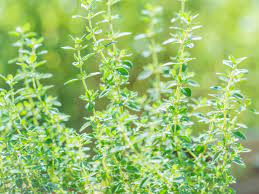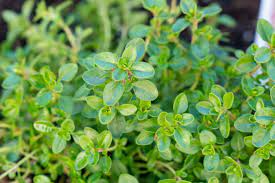Thyme leaves are the aromatic green leaves of the thyme plant (Thymus vulgaris), which is a commonly used herb in cooking. Thyme is native to the Mediterranean region but is now grown and used worldwide. It is known for its small, fragrant leaves and a slightly earthy, minty, and lemony flavor.
Thyme leaves are a versatile herb and are used in a variety of culinary dishes, both fresh and dried. They are often used in Mediterranean, French, and Italian cuisine and pair well with a wide range of ingredients, including poultry, meats, vegetables, and even in soups and stews. Thyme leaves can be added to dishes both as whole leaves or by stripping the leaves from the stems.
Thyme is also known for its potential health benefits. It contains various antioxidants and has been used in traditional medicine for its potential anti-inflammatory and antimicrobial properties.
In cooking, you can use thyme leaves in dishes like roast chicken, roasted vegetables, sauces, marinades, and more. It is a staple herb in many kitchen gardens and spice racks, offering a wonderful aroma and flavor to a variety of recipes.
The Economic Importance and Uses of Thyme Leaves

Thyme leaves (Thymus vulgaris) are not only known for their culinary uses but also have economic importance in various industries.
Here are some of the economic importance and uses of thyme leaves:
1. Culinary Use: Thyme is a popular culinary herb used in various dishes, including soups, stews, sauces, roasts, and Mediterranean cuisine. Its aromatic and earthy flavor enhances the taste of many dishes.
2. Medicinal and Health Products: Thyme leaves have medicinal properties and are used in traditional and alternative medicine. They contain compounds like thymol, which have antimicrobial and anti-inflammatory properties. Thyme is used in herbal teas, tinctures, and supplements to treat coughs, sore throats, and digestive issues.
3. Essential Oils: Thyme essential oil is extracted from the leaves and is used in aromatherapy and as an ingredient in cosmetics, perfumes, and soaps. It is valued for its strong and invigorating aroma.
4. Herbal Remedies: Thyme leaves are used in herbal remedies to alleviate respiratory problems, such as congestion and bronchitis, due to their expectorant and antimicrobial properties.
5. Food Preservation: Thyme oil and extracts are used in the food industry for their antimicrobial properties. They help extend the shelf life of some food products and inhibit the growth of spoilage microorganisms.
6. Perfume and Cosmetic Industry: Thyme’s aromatic properties make it a valuable ingredient in perfumes, colognes, and cosmetics. Its scent is often used to add depth and character to fragrance formulations.
7. Insect Repellent: Thyme oil is used in insect repellents and natural pesticides due to its strong aroma and potential insect-repelling properties.
8. Culinary and Medicinal Plant Cultivation: The cultivation of thyme as a culinary and medicinal plant can be economically important for farmers, nurseries, and herbal product manufacturers. It is relatively easy to grow and can be a profitable crop.
9. Ornamental Plant: Thyme is also used as an ornamental plant in gardens and landscaping. Its low-growing, aromatic foliage and pretty purple or pink flowers make it a desirable choice for decorative purposes.
10. Traditional Medicine: In traditional medicine, thyme has been used for its potential anti-inflammatory, antioxidant, and antispasmodic properties. It has been applied topically for minor skin irritations and as a gargle for throat infections.
11. Flavoring Agents: Thyme leaves and extracts are used in the production of flavoring agents for the food and beverage industry. They can be found in products like seasonings, sauces, and herbal teas.
Read Also: Dates Drupe: Economic Importance, Uses and By-Products
12. Agriculture and Pest Control: Thyme essential oil is used in agriculture as a natural pest control method to deter certain insects and protect crops.
The Products and By-products That Can Be Derived From Thyme Leaves
Thyme leaves are a versatile herb that can be used in a variety of culinary and non-culinary applications. While thyme leaves themselves are the primary product, there are several by-products and derivatives that can be obtained from them:
1. Dried Thyme Leaves: Drying thyme leaves is a common method of preserving them for culinary use. Dried thyme is a popular herb and can be used in various dishes, including soups, stews, and roasted meats.
2. Thyme Essential Oil: Thyme leaves can be steam-distilled to extract thyme essential oil. Thyme essential oil has various applications in aromatherapy, perfumery, and natural medicine due to its potential antibacterial and antifungal properties. It’s also used in some cosmetic products.
3. Thyme Infused Oil: Thyme leaves can be infused in a carrier oil, such as olive oil or grapeseed oil, to create thyme-infused oil. This oil can be used for cooking, as a massage oil, or for topical applications.
4. Thyme Tea: Thyme leaves can be used to make thyme tea. This herbal tea is often consumed for its potential health benefits, including soothing sore throats and promoting relaxation.
5. Thyme Extract: Thyme leaves can be used to make a concentrated thyme extract, which may be used in herbal remedies and tinctures.
6. Thyme Seasoning Blends: Ground thyme leaves are commonly used in spice blends, such as poultry seasoning or herbes de Provence, to enhance the flavor of various dishes.
7. Thyme-Flavored Vinegar: Thyme leaves can be added to vinegar to create thyme-infused vinegar, which can be used in salad dressings and marinades.
8. Thyme-Infused Butter: Thyme leaves can be mixed with butter to create thyme-infused butter. This flavored butter is excellent for enhancing the taste of dishes like roasted vegetables and grilled meats.
9. Thyme-Flavored Salt: Thyme leaves can be combined with salt to create thyme-flavored salt. This seasoning can be used to add a savory and aromatic element to various dishes.
10. Thyme-Flavored Honey: Thyme leaves can be added to honey, infusing it with a unique flavor. Thyme honey is a popular choice for drizzling over cheese or desserts.
11. Thyme-Based Cosmetics: Thyme extracts and essential oil can be used in cosmetic products like lotions, creams, and shampoos for their potential skincare and hair care benefits.
12. Thyme Potpourri: Dried thyme leaves can be used in potpourri mixtures for their pleasant scent and aesthetic appeal.
13. Thyme Medicinal Products: Thyme is sometimes used in herbal medicine for its potential health benefits, and it can be found in various herbal remedies, supplements, and tinctures.
14. Thyme-Infused Alcohol: Thyme leaves can be infused in alcohol to create thyme-infused spirits like thyme liqueur or thyme-infused vodka, which can be used in cocktails and cooking.
15. Thyme Smoke Flavoring: Thyme leaves, when dried, can be used as a smoking agent to add a unique flavor to grilled or smoked foods.
In conclusion, thyme leaves have a range of economic uses and importance, spanning the culinary, medicinal, cosmetic, and agricultural industries. Their versatility and unique flavor and aroma make them a valuable resource in various sectors.
Read Also: What Are the Benefits of Crayfish?

